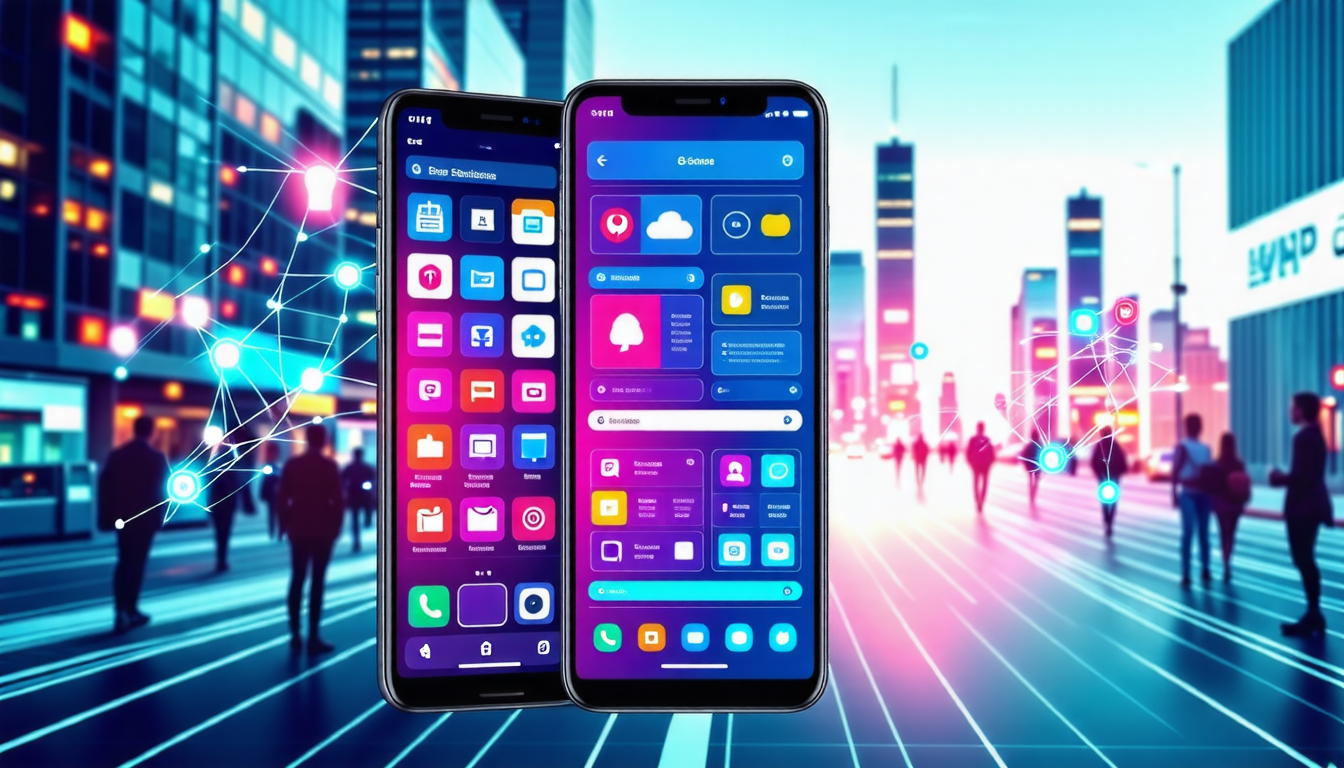|
In Brief
|
The rise of smartphone technology has paved the way for a new era of SaaS solutions, fundamentally changing the landscape of mobile technology. Organizations are harnessing the power of these innovative applications to drive digital transformation, enabling faster access to essential services and enhancing user engagement. With advancements in predictive analytics and personalization, mobile SaaS offerings are revolutionizing how businesses connect with their customers. As companies strive for efficient operations and exceptional customer experiences, these solutions are emerging as the backbone of modern mobile ecosystems.

The integration of Software as a Service (SaaS) within the realm of smartphones is revolutionizing the way businesses operate, enhancing efficiency, and improving user experiences. By leveraging advanced technologies, companies can now streamline processes and promote engagement in previously unattainable ways. This article explores the significant impact of smartphone SaaS solutions on mobile technology and how they are shaping the future of digital transformation.
Table of Contents
ToggleLeveraging Smartphones for Business Transformation
Smartphones serve as a powerful vehicle for business transformation, enabling organizations to harness the latest digital technologies rapidly. With the growing trend of remote work and mobile solutions, companies can leverage their smartphone capabilities to enhance operational efficiency, improve customer service, and reduce costs. The real-time access to SaaS applications on mobile devices allows for seamless collaboration, quick decision-making, and agile responses to market changes.
The Future of Mobile SaaS and Predictive Analytics
The trajectory of mobile SaaS is increasingly being shaped by innovations in predictive analytics and personalization. These advancements empower businesses to anticipate user needs, tailor experiences, and refine services accordingly. By analyzing data patterns and user behavior, companies can create custom solutions that resonate with individual users, thus fostering a deeper connection and driving higher engagement levels.
Mobile-First Design: Enhancing User Engagement
With a mobile-first design approach, developers focus on creating intuitive and accessible interfaces, which significantly boosts user engagement. Users can easily navigate SaaS applications, ensuring quick access to essential tools and resources. This design philosophy not only enhances the user experience but also contributes to increased adoption rates by reducing friction during interaction with software solutions.
The Integral Role of Mobile Apps in SaaS Connectivity
Mobile applications play a crucial role in how SaaS companies connect with their customers. These apps act as a bridge, facilitating seamless communication and ensuring that users receive real-time updates and notifications. By embracing mobile apps, SaaS businesses can enhance their marketing efforts, improve customer interactions, and ultimately drive higher customer satisfaction.
The Influence of AI on Mobile Technology
The emergence of artificial intelligence in mobile technology is transforming the functionality of smartphones. AI capabilities enable faster data processing, advanced recognition features such as face and scene detection, and enhanced security measures. Moreover, personal assistants powered by AI streamline daily tasks and communication, creating a more efficient and personalized user experience in a mobile SaaS environment. For more on this, visit AI in mobile technology.
Cost-Effective SaaS Solutions for Modern Businesses
Transitioning to a SaaS platform allows businesses to minimize operational expenses while maintaining flexibility and scalability. Mobile SaaS solutions offer easy access on various devices, ensuring that users can interact with their applications from virtually anywhere. As companies seek to enhance their performance, integrating mobile SaaS can streamline processes and promote a more agile approach to operations. For insights on how SaaS drives digital transformation, check this link.
The Growing Importance of User Experience in SaaS
In the competitive landscape of mobile SaaS, prioritizing user experience is crucial. By focusing on how users engage with software applications, companies can refine their services to meet expectations effectively and enhance satisfaction levels. A well-designed user experience fosters loyalty, as users are more likely to stick with an application that meets their needs optimally. For further reading on improving engagement, visit SaaS User Experience.
Data Management as a Pillar of SaaS Success
Managing data efficiently is vital for any SaaS provider to maintain a competitive edge. Effective data management strategies enable businesses to make informed, data-driven decisions that enhance overall performance metrics. As organizations implement mobile SaaS solutions, they must adopt best practices to ensure seamless data flow and accessibility across devices. For more on data management in SaaS, click here.
Enhancing Communication with SaaS Messaging Services
In today’s fast-paced environment, clear communication is essential for business success. SaaS messaging services enable organizations to streamline internal and external communications, facilitating collaboration among teams and improving customer interaction. These tools can significantly enhance operational efficiency by enabling real-time communication and quick access to important information. Discover more about enhancing communication through messaging services here.
SaaS Trends Shaping the Future of Mobile Applications
The evolution of mobile SaaS applications is driven by ongoing technological advancements and user preferences. Trends such as increased integration of AI and machine learning, personalization features, and improved mobile security protocols are paving the way for future innovations. As businesses adopt these trends, the impact on user experience and operational efficiencies will continue to reshape the landscape of mobile technology.
| Feature | Impact on Mobile Technology |
| Predictive Analytics | Enhances user experiences by delivering personalized content and suggestions. |
| Mobile-First Design | Increases user engagement and accessibility of SaaS applications on smartphones. |
| AI Integration | Improves data processing speeds and offers advanced features like facial recognition. |
| Cloud Migration | Reduces operational costs and streamlines workflows through centralized data access. |
| Scalability | Supports businesses in adapting tools as they grow, ensuring long-term usability. |
| Data Management | Facilitates better decision-making by providing real-time analytics and insights. |
| Customer Engagement Tools | Enhances communication efficiency and strengthens relationships with clients. |
| Subscription-Based Model | Offers flexibility and cost-effectiveness while minimizing upfront investment. |
In today’s rapidly evolving digital landscape, smartphone SaaS solutions are at the forefront of transforming mobile technology. These innovative approaches not only enhance the functionality of mobile devices but also enable businesses to streamline operations, improve user engagement, and leverage the latest advancements in technology. This article explores how these solutions are reshaping the way we interact with mobile devices and the potential for future growth.
The Role of SaaS in Digital Transformation
As organizations embrace digital transformation, SaaS platforms have become essential in modern business strategies. Transitioning traditional software to a SaaS model allows companies to reduce operational costs, streamline processes, and enhance customer service. By leveraging the capabilities of mobile devices, businesses can deliver services directly to their clients, facilitating seamless communication and greater accessibility.
Advancements in AI and Personalization
Artificial Intelligence (AI) is playing a significant role in the evolution of mobile SaaS applications. AI algorithms analyze user behavior and preferences, enabling the development of highly personalized experiences. This transformation fosters deeper connections between businesses and customers, as mobile SaaS tools become increasingly tailored to meet individual needs. By integrating these technologies, organizations can significantly enhance user satisfaction and engagement.
Mobile-First Design Impact
With the rise of mobile usage, a mobile-first design approach has become crucial for software developers. This design ethos prioritizes user experience on mobile devices, ensuring that applications are accessible, responsive, and engaging. Such design enhancements can lead to increased user engagement, as customers can quickly and easily access the software on their smartphones. Consequently, companies may see improved marketing success through their SaaS offerings.
The Future of SaaS Applications
As we look to the future, the demand for SaaS applications will continue to grow. Businesses that harness the power of these applications will find themselves better equipped to adapt to changing market conditions. Factors such as scalability, flexibility, and accessibility across multiple devices highlight the importance of integrating SaaS solutions into mobile technology. Companies can enhance productivity and performance by adopting these innovative strategies.
Overcoming Challenges with Mobile SaaS
Despite the advantages, implementing mobile SaaS solutions can present challenges. Organizations must ensure their systems are secure and compliant while delivering a reliable user experience. Strategies for addressing these challenges include adopting best practices for customer support, data management, and performance optimization. By focusing on these areas, businesses can create a strong foundation for their SaaS initiatives.
In conclusion, the intersection of smartphones and SaaS solutions significantly transforms mobile technology, making it imperative for businesses to explore these opportunities. By investing in innovative applications, adopting a mobile-first approach, and leveraging AI, companies can position themselves for success in this ever-evolving digital landscape.
- Enhanced User Engagement: Mobile-first design facilitates quicker access to applications.
- Predictive Analytics: Anticipates user needs and preferences for tailored experiences.
- AI Integration: Boosts functionality with features like face recognition and personal assistance.
- Cost-Effective Scalability: SaaS solutions allow businesses to grow without heavy infrastructure investments.
- Seamless Collaboration: Facilitates teamwork through mobile apps that keep teams connected.
- Streamlined Processes: Reduces operational complexity through mobile ERP systems.
- Data Management: Efficient handling of information through cloud-based storage and tools.
- Real-Time Updates: Ensures that users always have access to the latest features and information.
- User-Centric Design: Focuses on enhancing the overall experience for end-users on mobile devices.
- Efficient Marketing Solutions: Mobile apps redefine customer interaction and engagement strategies.
Transforming Mobile Technology with Smartphone SaaS Solutions
The integration of SaaS solutions in the smartphone ecosystem is revolutionizing mobile technology, enabling businesses to streamline operations, enhance user engagement, and leverage advanced analytics. As organizations embrace the digital landscape, these mobile applications provide critical tools and frameworks necessary for seamless interaction, productivity, and transformation within the industry.
Accelerating Business Transformation
Utilizing smartphones for digital transformation allows businesses to implement changes rapidly. The mobile-first approach is becoming a priority as it offers companies quick access to essential tools and technologies. By integrating SaaS within mobile platforms, organizations can significantly reduce operational costs while enhancing their overall service delivery.
Mobile-First Design for Enhanced Engagement
The shift towards a mobile-first design plays a crucial role in increasing user engagement. Such design methodologies ensure users have quick and easy access to software, thus driving interactions substantially. This increased accessibility not only improves user experience but also encourages the regular use of the application, creating an ecosystem where users are maximally engaged.
The Role of AI in Mobile SaaS Solutions
Artificial Intelligence powered by mobile SaaS solutions is changing the way businesses operate. AI technologies allow smartphones to process data at unparalleled speeds, recognize patterns, and personalize user interactions. From enhancing security to personal assistant capabilities, AI integration in mobile technology ensures that users receive tailored assistance, ultimately transforming everyday tasks into streamlined experiences.
Predictive Analytics for Better Decision-Making
The future of mobile SaaS is driven by advancements in predictive analytics. Businesses can utilize these analytics to predict user behaviors, enabling them to make informed decisions that enhance user satisfaction. As companies collect large amounts of data, leveraging this information through predictive analytics will provide insights that can tailor offerings, refine marketing strategies, and boost customer loyalty.
SaaS Solutions for Enhanced Mobility
Mobile applications embedded with SaaS functionalities facilitate greater flexibility in business operations. Employees can access necessary tools from any location, ensuring that work can continue without interruption. This capability empowers teams to maintain productivity regardless of where they are, thus fostering a more dynamic work environment.
Scalability and Flexibility
One of the primary advantages of adopting SaaS solutions is their inherent scalability. As businesses grow, they can easily scale their SaaS applications to accommodate increased demands without needing a complete overhaul of their systems. This flexibility allows organizations to adapt swiftly to market changes, ensuring they stay ahead of the competition.
Future Trends in Mobile SaaS
The landscape of mobile technology is continually evolving, with trends such as increasing demand for cloud-based applications and mobile optimization on the rise. Future SaaS applications are set to focus on enhancing user experience through more comprehensive features, smoother interfaces, and higher levels of customization. This shift will enable businesses to provide valuable services that reflect individual customer preferences perfectly.
Emphasis on Security and Data Protection
As mobile SaaS grows in popularity, the demand for stringent security measures becomes essential. Organizations must prioritize protecting sensitive data within their applications, ensuring user information remains safe and secure. This focus on data security not only builds trust with customers but also complies with necessary regulations in the digital space.
Frequently Asked Questions about Smartphone SaaS Solutions Transforming Mobile Technology
What are Smartphone SaaS solutions?
Smartphone SaaS solutions are cloud-based software applications that can be accessed and utilized through mobile devices, allowing users to leverage powerful functionalities directly on their smartphones.
How do Smartphone SaaS solutions impact mobile technology?
These solutions enhance mobile technology by providing faster access to data, improving user experience, and integrating advanced features like predictive analytics and personalization.
What benefits do SaaS applications offer for mobile users?
SaaS applications offer benefits such as cost-effectiveness, scalability, and flexibility, allowing users to efficiently manage their tasks from any device.
How is user engagement increased with mobile SaaS?
Mobile-first design in SaaS applications facilitates increased user engagement by enabling quick and easy access to software functionalities from smartphones.
What role does AI play in Smartphone SaaS solutions?
AI significantly enhances Smartphone SaaS solutions by enabling faster data processing, personalized recommendations, and improved security features, thereby transforming user interactions.
Can businesses benefit from transitioning to SaaS mobile applications?
Yes, transitioning to SaaS mobile applications can streamline processes, reduce operational costs, and enhance customer service, providing a competitive advantage in today’s digital landscape.
What trends are shaping SaaS mobile applications?
Emerging trends in SaaS mobile applications include increased mobility, reliance on AI technologies, and a focus on user-friendly interfaces to enhance customer satisfaction.
How do mobile SaaS solutions contribute to digital transformation?
Mobile SaaS solutions play a crucial role in digital transformation by enabling companies to adopt new technologies rapidly and efficiently, ensuring they stay relevant in a fast-paced market.


